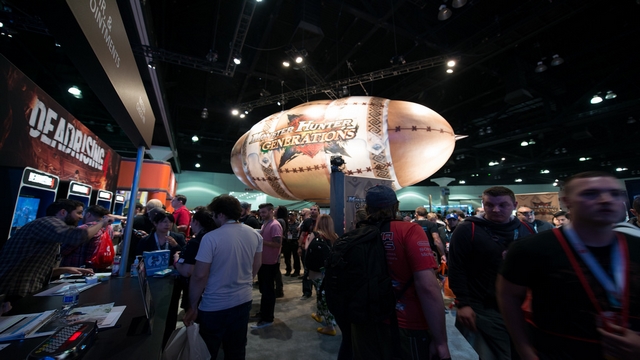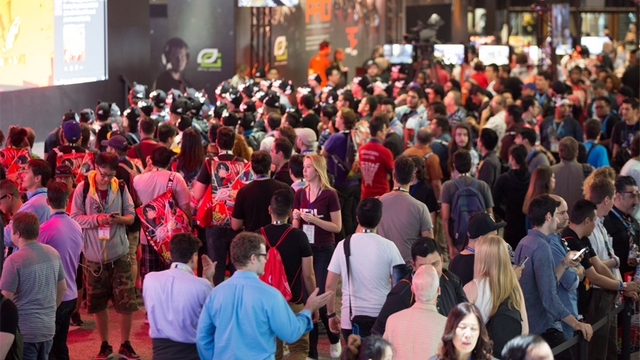Today it has been announced by the ESA that E3 will be open to the public. The Electronic Entertainment Expo has been exclusively a press only event, but for the first time in a while the public will be able to purchase tickets from February 13. 15,000 tickets will be available for purchase priced at $250 or $150 for early buyers.
The event is scheduled for June 13 to June 15 and will be held from the Los Angeles Convention Center. The ESA will be partnering with Geoff Keighly for interviews and features.
Now I’m set to argue this is a mistake. The event should have remained a press only invite. My reasoning doesn’t lean on a holy grail mentality — my opinion is mainly from a logistics standpoint.
In a Nutshell…
Let’s say you have anxiety issues over crowds. This would be terrifying and that’s putting it mildly. Now, perhaps you have no problem with crowds. Understandable, but tell me how fun this scenario would be? You would be essentially swimming through crowds of 15,000 across your 3 days at the expo — these numbers don’t include members of the press, or other industry employees (developers, PR, marketers, etc).
History lesson
Before we continue here’s some history to reflect upon. E3 is the industry’s largest annual trade show and party. It was founded in 1995 and has had attendants numbering over 60,000. Now the show effectively is where companies are competing to gain attention among the press and public whom could gain attendance.
In 2006, it shifted to invitation only. The reason for this change was that exhibitors felt the battle for best booth, and so forth, became too much. They reached their breaking point, and so with this change the show became quieter. Thus, over the years it has lost some of it’s luster — but it’s place of importance remained.
So what lead to that the tipping point that made gaming companies demand it become press only? It became bigger and harder to manage than they imagined. The money being spent didn’t make sense in the midst of the chaos.

Should I Stay or Should I Go?
Now should you go? Allow me to explain with the picture above. Now this isn’t E3 but this is an example of what you’ll be seeing. Mind you, if you watched any show of E3 over the past few years, you’ll notice something. It’s already crowded and that is only the press and other industry individuals — how much of a positive experience could you have with this?
For every booth, presentation, and demo you’d like to visit there will be nearly 10,000 plus wanting to do the same. An overcrowded party is definitely not a fun party. Long waits, getting around in cumbersome fashion, and that general awkwardness that arises from crowds.
In a more serious note, the matter of security is also important. Of course it’ll be secure but it would be far too easy lose your items in this madness — let’s assume no one would ever steal anything, it’s easy to get jostled, and drop something.

The Show Must Go On…
Now let’s move to how this would effect the show. So the main purpose of E3 is that it’s a showcase.
This influx of people would get in the way of press doing their work. Tell me how effective the coverage of show will be with 15,000 more bodies to get through? An example; there’s an indie title or game that seems really interesting. However, the press may overlook it due to having to make enough time to make it to AAA demos — games will be overlooked and that would be a determinant for everyone at large — as wading through crowds takes time right?
The other victim would be an effective show for viewers at home. Let’s say that a publication is at a demo and conducting an interview. How effective will that interview be when drowned out by thousands of extra (unnecessary) voices? I’d be willing to wager it won’t be a very good one. With the quality of work being effected readers, viewers, and consumers overall would be the losers. The only interviews which would be any good, are the ones who are conducted by larger publications with more money for high end equipment — such as high end directional microphones, and camera rigs.

Coming full circle…
Another reason why this is a bad idea is because history would be repeating itself. The Expo moved away from a large showing because of the levels of stress it brought. What was being affected was that the attendance numbers took away from the show. It was more party than industry annual show. The ESA will of course do their best to organize the show overall. You know what you can’t control? A lot of people. That’s a massive, unpredictable, variable.
The other argument I offer is that the audience may not necessarily understand the show’s purpose. I mean yes, everyone knows it’s a show of previews and demos. Companies often take the time to create a workable and presentable demo for their titles. In truth, these demos may not be a proper representation of a game in anyway. Now combine the fact they can only be played for say 5-10 minutes, the said title could end up receiving unfair public opinion.
In the End…
…the show is best left in its current form. It should be a show for the industry and those work to provide us all the news surrounding it. It’s a big spectacle anyway, and it already does well without the extra visitors. As of now E3, while yes it’s not perfect, but it’s fine without the extra white noise.







Published: Feb 8, 2017 03:34 pm